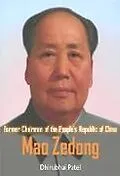Mao Zedong, also known as Chairman Mao, was a Chinese communist revolutionary who became the founding father of the People's Republic of China, which he ruled as the chairman of the Communist Party of China from its establishment in 1949 until his death in 1976.
Inhalt
Mao Zedong Chapter 1: Short Stories of Mao Zedong Chapter 2: Life Style of Mao Zedong 2.1 Fourth Normal School of Changsha: 1912-19 2.2 Early revolutionary activity 2.3 New Culture and political protests, 1919-20 2.4 Founding the Communist Party of China: 1921-22 2.5 Collaboration with the Kuomintang: 1922-27 Chapter 3: Civil War 3.1 Base in Jinggangshan: 1927-1928 3.2 Jiangxi Soviet Republic of China: 1929-1934 3.3 The Long March: 1934-1935 3.4 Alliance with the Kuomintang: 1935-1940 3.5 Resuming civil war: 1940-1949 Chapter 4: Leadership of China 4.1 Great Leap Forward 4.2 Consequences 4.3 Split from Soviet Union 4.4 Great Proletarian Cultural Revolution 4.5 State visits Chapter 5: Death and aftermath Chapter 6: Legacy Chapter 7: Genealogy Chapter 8: Personal life 8.1 Writings and calligraphy 8.2 Literary works 8.3 Portrayal in film and television Chapter 9: Great Leap Forward 9.1 Agricultural collectives and other social changes 9.2 Hundred Flowers Campaign and Anti-Rightist Campaign Chapter 10: Organizational and operational factors 10.1 People's communes 10.2 Industrialization 10.3 Backyard furnaces 10.4 Irrigation 10.5 Crop experiments 10.6 Treatment of villagers Chapter 11: Consequences 11.1 Famine 11.2 Famine deaths 11.3 Methods of estimating the death toll and sources of error 11.4 Causes of the famine and responsibility 11.5 Deaths by violence 11.6 Impact on economy 11.7 Resistance 11.8 Impact on the government
